Molly Borrows-a-lot – The Secret World of Arrietty
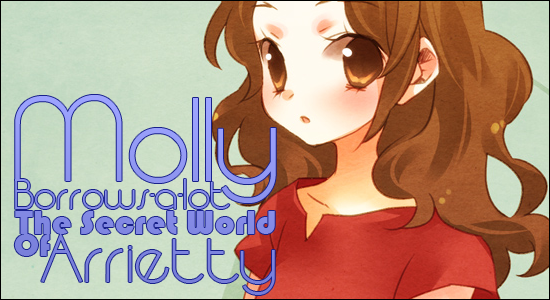
Ever wonder what lives under the floorboards? Take a peek into a world where everything small is could be the greatest danger and every human step is a natural disaster. Explore unique and unlikely bonds as “beans” and “borrowers” peacefully coexist. Welcome to The Secret World of Arrietty
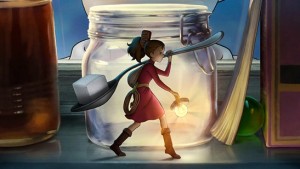
Let’s be honest here, I don’t care that I was in a theater audience of primarily 8 years and under. I don’t care that there is an unspoken stigma of adults going to a kid’s movie without a 5-year-old reason to be there. I don’t care. Why? Because it’s Ghibli. I wasn’t about to waste this chance to finally see my first big-screen Ghibli film. And I am glad I didn’t. Arrietty is a gift that just kept on giving throughout the following week. It is for the events that transpired the days after that I will hold this film close to my heart. With that said, let’s get on with the review!
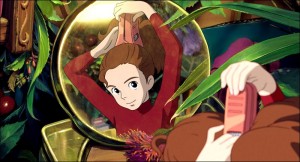
Arrietty is a modernized interpretation of Mary Norton’s popular 1950’s children’s book series called The Borrows. Hiromasa Yonebayashi of Ghibli Studios took the basic premise of little people living in human dwellings and set it in suburban Japan. It’s to no surprise that Ghibli kept certain defining features of the books intact, such as the character names, but squeezed in a few of their calling cards as a nudge and wink towards loyal Ghibli fans such as myself. This quietly whimsical retelling follows 14-year-old Arrietty as she embarks on her first “borrowing” with her father, a long time borrower, Pod (voiced by Will Arnett). Arrietty is of a species of humanoid creatures called “borrowers” or, as the human “beans” call them, the little people, as they strongly resemble their full-size counterparts. The borrowers, living hunt and gather lives under the homes of “beans”, take the supplies they need to survive under the shroud of night.
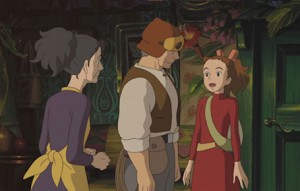
Arrietty is a brave, efficient girl (a classic Ghibli heroine by all means) and claims to be unafraid of the “beans”. Her mother, Homily (voiced by Amy Poehler), is an excitable worry-wart, who is in a constant panic over Arrietty’s need to venture outdoors where the “beans” could find her. Pod, a bit of a crafts-man, is a soft-spoken man of few words who sees his daughter as a strong, capable girl. Together, they have built a happy little home under the floors of one sneaky house-keeper, Hara (voiced by Carol Burnett, yes, THAT Carol Burnett) and an unimpressed Aunt Jessica (voiced by Amy Poletti).
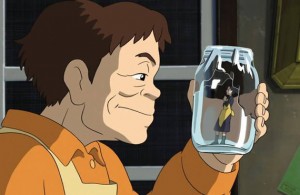
Here’s where things get fun. Shawn, a weak-hearted boy resting at his aunt’s home before a major heart surgery happens upon these little people of his mother’s stories. In the dead of night, Shawn spots Arrietty trying to filch a tissue. In a panic, she drops her borrowed sugar cube and gets right out before matters get worse. Well, matters got worse, but I won’t get into that. You’ll just have to see for yourself.
I simply can’t sell this one short. For every aspect that this film fell short, it was made up for in pure, heartwarming and imaginative engagement. Sure, the story’s end was a tad abrupt and certain characters just lacked the development they needed, but I can’t possibly hold anything against Ghibli for this refreshing little adventure. I will say, I felt a severe deficiency of soot-sprites. What’s a Ghibli movie without soot-sprites?!
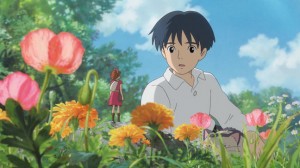
I suppose I do have a small bone to pick. When all is said and done, this film barely breaks the 90 minute mark. In about an hour and a half, we see little to no character development on the part of our to main protagonists, Arrietty and Shawn. Half of the film was spent establishing the distinct social isolations imposed on the Borrowers and beans. To that end, only one conflict came to pass and its resolution left me wanting just a bit more meat. Shawn, played by up-and-coming Disney Channel regular, David Henrie, had little to do but weeze a bit and awkwardly spit out his own take on the meaning of existence. Though his story lacked a bit of backbone, his quiet, contemplative nature allowed his character to be the perfect vessel for accepting some less-than-ordinary circumstances.
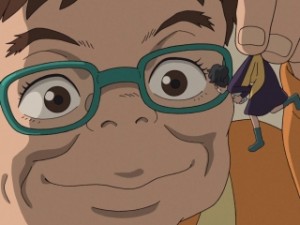
In short, the characters felt a bit flat. Take Hara for instance. Donning the typically Ghibli frog-face features, Carol Burnett had the room to flex her charismatic muscles. I only wish we got something more out of her character. She was crazy with no motive. She had no reason to want to capture the Borrowers nor did she have just reason to call pest control. She was simply a well-acted fruit-loop with a loose end. But one can’t deny that Carol Burnett hit her voice acting right out of the park.
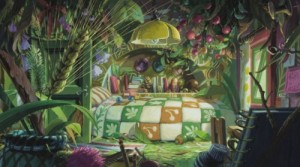
Here’s where I get all sentimental, so just humor me for a bit. I hold a special place in my heart for Ghibli’s films if only for the real-life bonds they forged and the memories they created. Arrietty brought me to place where I could see my childhood through the qualitative eyes of an adult but experience it with the abandon and whimsy of a child. Something beyond our wildest imaginations could be hiding in the grass we step in every day. To us, it is simply grass, to a child and to a Borrower, it is a forest rife with the potential for earth-shaking discovery. Something in the setting, with its traditionally painted skies and rich greenery brought me back to this mind-set that I abandoned years ago.
I had the pleasure of exchanging thoughts on Arrietty this past Monday with a professor of mine with two young children. She opened me up to a perspective that I cannot even begin to imagine for myself. Viewing the film as a parent of a young child gave her and myself insight into just how keen children really are.
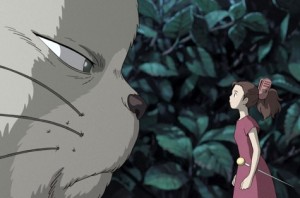
She wrote, “I asked my daughter (6 years old) what her favorite part was and she said ‘all of it’.” This film is quiet with barely as much action as the trailers boast in their clever editing. We tend to assume that children need constant activity to warrant sitting through a movie for a couple of hours. It really doesn’t take much to evoke an emotional response in a child when you introduce them to a story that could take place in their own backyard.
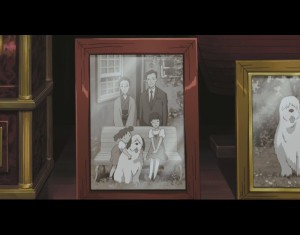
She continued, “I think that she started to consider the fragile nature of life with the Shawn character’s heart condition (she hasn’t really faced that in much media, since things have gotten sort of Barney-fied for kids).” Faced with the brutal nature of his own mortality, Shawn’s story introduces children to the idea of scary circumstances that are simply beyond their control. We are gently assured that though life is fleeting, there is no reason to live in a state of perpetual acceptance of fate. However, we don’t skirt around the issue. It is ever present in the world, there is no denying it, but can’t we enjoy what we have with a little reckless abandon?
What I suppose I want you to take away from this movie isn’t just a feeling of relief with an abrupt return to the everyday, but a new perspective, or perhaps your old childish instincts, on the world around. The grass in your yard is a jungle to a Borrower and that house cat a giant among beasts. We, as adults, tend to overlook the potential for exploration and discovery in our own backyards. Kids and grown-ups alike can benefit from seeing the “unexpected” in the everyday. Perhaps if we saw things the way the Borrowers do, we can get a fresh, exciting perspective of the otherwise monotonous and ordinary. We forget about that little thing called imagination.
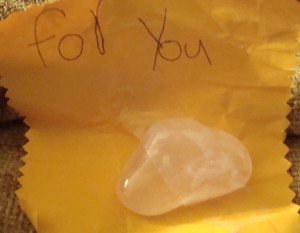
“What I love the most is that she wanted to leave things around the house for Arrietty with notes attached”, she continued on. “I take them and she gets really excited about it — again, there isn’t much out there to push kids to use their imagination and live in the ‘abstract’ or ‘unseen’, so I love that she is going to that instead of playing so much Angry Birds.” This. This made my heart sing. This movie did its job. The following day my professor caught me on my way into class and handed me a crumpled orangeish-yellow sheet with “For You” scrawled along the top. Within the paper’s jagged edges was a gleaming, polished rose-quartz taped down with scotch tape. This was her daughter’s latest gift to Arrietty. In return, I filled a Borrower-sized bottle with tiny bits of polished garnet with Arrietty’s sewing-pin sword coming out of the top if the cork. “For you; From Arrietty” I wrote. It is my hope that she carries that as a reminder to never let go of childish whims. You never know when a new adventure is afoot.
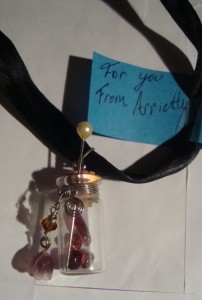
Films rarely evoke any sense of nostalgia the way Ghibli films do. Perhaps I speak for myself, but Arriety brought me back to days I had long forgotten and my professor’s daughter reminded me of how a little time spent at a Borrower’s eye-level could refresh my otherwise tedious, regimented life-style. Friendships arise in the most unlikely of forms, even of Borrower and human “bean”. And most importantly, when that cube of sugar or stack of crackers mysteriously go missing, remember to step lightly because you never know when a Borrower is in your midst.
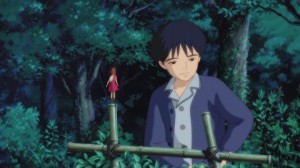
This was a special treat for me to share with you this month. I want to graciously thank my professor once more for giving me her time, insight and treasures. I am more than happy to play Arrietty again at any time. Of course, thank you, my dear ranters, for another month. Come back in March for a continuation of this family-friendly series. Until then…
Bibbles out
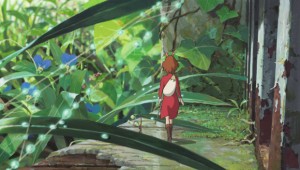



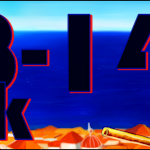
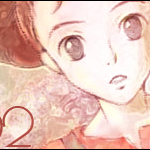

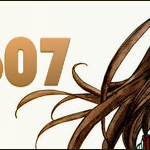









After seen this movie did you remember back when you were a child and used to believe in fairy tales?
Who said I ever stopped? ^^
I never said that you “stop” I said it it brought back memories for me it did reminded something that I forgot, its silly but its something I wanna believe again
Life would be so mundane if we simply accepted everything to be mere fable or fiction. I still believe the mushrooms that grew in my backyard were homes for fairies. The microcosm of Arrietty’s world assures me that there is still magic in what we can’t always see. It may have been a movie, but it made me want to be a kid again only so I could believe in such fairy-tales without judgement. I miss it, really I do.
This was a cute movie, but I felt the same concerning the ending. Ghibli has a habit of leaving romantics wanting more (besides Whisper Of The Heart and Howl’s Moving Castle), but even so the lack of bond (?) at the end of the film left me a little disappointed.
Sure, Shawn never forgot Arrietty, but I was surprised he never sought her out again and that doll house was never used in anyway. It felt like a good-bye with a friend with no real conclusion.
I loved the atmosphere though and how you felt small like Arrietty. The sound effects were amazing in that regard. The music was also something I really enjoyed and usually the music from Ghibli films don’t really stand out to me (Country Roads being the exception of course).
I liked the film overall, I enjoyed what I saw and have fond memories of it. It isn’t one of my favorites, but I still felt engaged and curious as to what would happen next. While unusual for Ghibli I would be thankful for some sort of sequel, snippet, etc? If Whisper Of The Heart and The Cat Returns can do it I don’t see why Arriety can’t in some form (direct sequel is obviously out of the question and more just related).
But the movie was charming and I wish my mom had seen it with me, haha.
I’m glad you felt the same about the ending. I was pulling for more of an epilogue or perhaps an extra 10 minutes tacked onto the runtime. The end just felt empty. But the end also encapsulated the idea of leaving friends behind and moving onto new chapters. It really hit home with me for many reasons.
If I had more time, I would have noted the music for sure. It was calming and did not overwhelm the scenes at play. Though, I could say that it may have aired on the side of forgettable. The foley artists must have had a blast with this project. The sounds of the larger-than-life insects just polished off that feel of being so small. Everything just felt as though it was from a child’s point of view. The largeness of it all just felt exciting!
I never said that you “stop” I just said that if it brought you back memories for me it did, it reminded me of something long forgotten that its silly but, it makes me wanna believe it once again
I was also disappointed in the ending, although more for the selfish reason of seeing this movie as a chance to provide the book with a happier, not-so-wistful ending.
I would point out, however, that another message is sent to young readers and viewers of this story through the mentioned one of certain things being beyond control: that is, that some things are beyond their control simply because of their age. This is something kids already feel keenly. The two characters who could–and did–challenge the rule against interaction between the two peoples were both too young within their own families to make that understanding extend beyond themselves. They weren’t of consequence enough within their family hierarchies to change the rules governing their existence–a situation familiar to children worldwide. The two characters who could have made things better weren’t allowed to–and that is a scary message to send kids. . .
I appreciate that sentiment. There was a feeling of helplessness in the events that followed Shawn and Arrietty’s meeting. To be at an age where every aspect of your life is decided for you is frustrating. One can be simply too young to comprehend societal reasons for the parameters set unto them by their families. Yet, I feel this isolation was one sided. The Borrowers avoided humans for the sake of protection. Shawn’s family wished fully to live amongst the Borrowers and it was only Hara that pushed to interfere. However, the protagonists’ earnestness was reassuring and completely within reason for a real life scenario (save the size difference, ha).
Children may very well find themselves in a situation where their parents’ word trumps their own and they may have to take initiative despite repercussions. This movie, despite the whimsical nature of it all, proceeded with an air of truthfulness that I fully appreciated. Well, here I am rambling again! And I am not entirely sure any of that made sense. *midtermbrainmush*
I see everyone is disappointed with the ending of this fabulous movie. After watching NC’s review of this movie, watching it myself, and reading Molly’s amazing article I feel that there was a lot unsaid in the ending. I don’t think it was a terrible ending, and I do like NC’s comment that if you didn’t have the ending animation play with the credits that it would make for a lot stronger ending
I wasn’t disappointed in the ending, but I do think the ending could of been heightened a bit. The ending was open-ended, and really allowed for multiple scenarios to take place. Shawn as a character for a protagonist in a so called “children’s movie” is a very dark, but uplifting character. He does harness the willpower to move on that earlier in the film he lacks. A fact he gets from Arrietty who I thought when watching the film was very rebellious against many of the rules that the Borrower’s follow. Though she follows some of them to the heart, she is just a curious as the “beans” that her parents fear.
Both Arrietty and Shawn are curious people, and through their curiosity of each world help each other when the time comes, and create a friendship that bridges their difficulties. Arrietty seeks out the boy on multiple occasions, once before, and later a couple of times after the first encounter. This is of course forbidden by the Borrowers as they don’t want to expand the boy’s curiosity. She is just as curious in the boy’s world, as the boy is in her world.
I feel that in this world that type of exploration is void in not just a child’s world, but in the adult word as well. In a world where people are afraid to take risks, and get stuff done because of fear. I find that this movie is very relatable to our modern world in that context. It teaches kids things that they may not even know, and I’m sure kids will pick up on many of the things I did, because contrary to popular opinions kids are smart, and I hope the best for the future of the kids that picked up some of the things I found out in the movie.
Someone got it! This makes me so very happy!! You see, I wasn’t trying to say the ending was bad. It just felt understated and a bit empty. To leave a home behind in search of new waters is terrifying. The way I saw it was that in the way you leave your friends, home and childhood behind, leaving an immense and wanting hole in your heart, this ending left you wanting to return despite having to forge ahead, just as Arrietty’s family had to do. To a child, home should be a constant, or at least it was for me. Arrietty’s goodbye to Shawn, though lacking, was still touching and struck a cord with my own experiences of having to leave the people and places I hold closest. I suppose, it pained me to see so much of my own life in their story’s end. I wanted to see something more because I already know how that goes.
Children amaze me sometimes. In truth, similar to my professor’s experience, my own parents showed me Totoro at 4 years old. As a result, I collected seeds and pebbles and buried them in our back yard, lifting my arms high in hopes that Totoro would come to make them grow. Children pick up on subtle nuances that even I didn’t catch. Arrietty and Shawn are prime examples, as you put it, of kids simply being curious, understanding and open. This film teaches children that accepting the strange or the “abnormal” will open up so many wonderful doors.
To see the extraordinary in the mundane is a talent children harbor, but we give them no room to utilize it. Heck, we all do but we remain too concerned with the widely-accepted and well-tested laws of our own worlds to try. I propose a day in which all of us must walk around upside down, down low or through paper telescopes simply to see something new in what we see everyday. Aaaaand, I ramble 😛
[…] content provider, MollyBibbles, has already done an article on the film itself, so I won’t blather at you about my own assessment or any nitty gritty details. What I […]